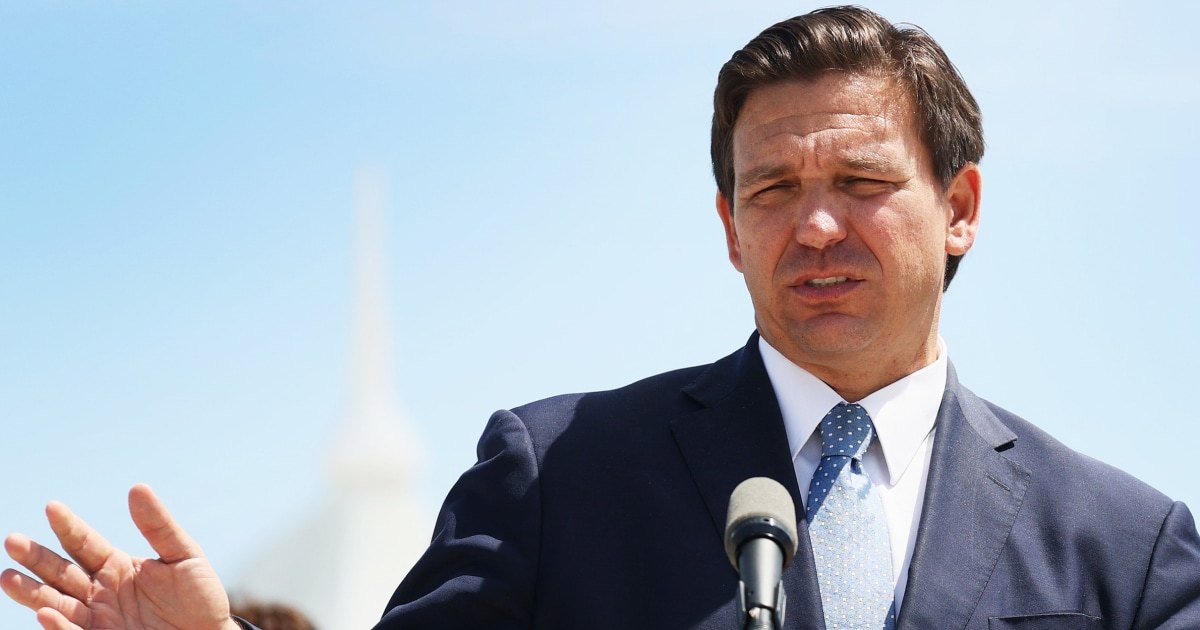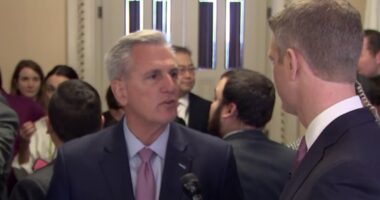
The Florida Health Department issued guidance Wednesday that seeks to bar both “social gender transition” and gender-affirming medical care for people under 18 in the state.
The nonbinding guidance, which doesn’t change the law, comes as Republicans in dozens of states seek to bar gender-affirming medical care for transgender youth.
The Health Department’s guidance, issued by Gov. Ron DeSantis and state Surgeon General Joseph A. Ladapo, goes further than most state bills seeking to restrict access to certain transition-related medical care, because it recommends against both medical transition for minors — including puberty blockers, hormone therapy and operations — and says “social gender transition should not be a treatment option for children or adolescents,” which other states have generally not said.
The guidelines say that there is a lack of conclusive evidence that affirming care for trans youths has positive mental health outcomes and that it could have “irreversible effects.” The Health Department also cites a 2015 paper published in the International Review of Psychiatry that says 80 percent of “those seeking clinical care will lose their desire to identify with the nonbirth sex.”
The Health Department said the guidance was prompted by a fact sheet the U.S. Department of Health and Human Services released last month, which said early gender-affirming care “is crucial to overall health and well-being” of transgender children and adolescents, “as it allows the child or adolescent to focus on social transitions and can increase their confidence while navigating the healthcare system.”
Ladapo criticized the federal government’s guidance in a statement Wednesday, saying that it failed “at the most basic level of academic rigor” and that as a result it “was never about health care.”
“It was about injecting political ideology into the health of our children,” Ladapo said. “Children experiencing gender dysphoria should be supported by family and seek counseling, not pushed into an irreversible decision before they reach 18.”
Backlash to the guidance from LGBTQ advocates was swift. Sam Ames, the director of advocacy and government affairs for the Trevor Project, an LGBTQ youth suicide prevention and crisis intervention organization, noted that all relevant accredited medical associations support gender-affirming medical care for transgender youth.
Ames also said in a statement that in another release about the federal government’s guidance Wednesday, the Florida Health Department selectively cited the Trevor Project’s 2021 peer-reviewed study that examined hormone therapy among more than 9,000 trans and nonbinary youths. Ames said the Health Department “ignored that receiving this gender-affirming care was associated with nearly 40 percent lower odds of recent depression and a past-year suicide attempt among those under 18.”
Dr. Jack Turban, a psychiatrist at the Stanford University School of Medicine who studies the mental health of transgender youths, said on Twitter that “broad medical consensus disagrees with just about every aspect of this memo from the Florida Department of Health.”
He cited 2016 research that found that youths who undergo social transition have favorable mental health outcomes. He said there are also 16 studies related to gender-affirming medical care for trans youth and that “the vast majority show improvements in mental health with these interventions.”
Turban criticized the statistic the Health Department cited to assert that most youths come to identify with their birth sex, saying it “is false and based on prepubertal children who aren’t eligible for gender-affirming medical interventions anyway under current guidelines.”
He added that gender-affirming medical care for trans youths “has been woefully politicized.”
“Decisions in this space should be made by doctors and families, not politicians who hold no expertise in this area,” he said. “We should follow the Endocrine Society guidelines, not political nonsense.”
Three states — Arkansas, Tennessee and Alabama — have enacted restrictions on gender-affirming medical care for minors. A federal judge blocked Arkansas’ law in July, and Alabama’s hasn’t yet taken effect.
Sarah Lovenheim, the assistant secretary for public affairs at the Department of Health and Human Services, also issued a statement about Florida’s guidance in a tweet.
“We are committed to protecting young Americans who are targeted because of their sexual orientation or gender identity, and supporting their parents, caretakers and families,” she said.
Daniel Tilley, the legal director of the American Civil Liberties Union of Florida, said in a statement that while Florida’s guidance is nonbinding “and currently not enforceable, we know that the impact will stoke fear among transgender youth, their parents, and their health care providers.”
Some advocates also fear that DeSantis, who is widely seen as a potential contender for the 2024 Republican presidential nomination, could use the guidelines in a way similar to state officials in Texas.
In February, Texas Attorney General Ken Paxton issued a nonbinding legal opinion that said providing gender-affirming medical care to trans minors was considered child abuse under state law, even though it didn’t change the law itself. Gov. Greg Abbott then directed the state’s Child Protective Services agency to investigate claims of child abuse filed against parents who were suspected of providing their transgender children with such care. A state judge temporarily blocked the investigations last month.
Follow NBC Out on Twitter, Facebook & Instagram
Source: | This article originally belongs to Nbcnews.com









